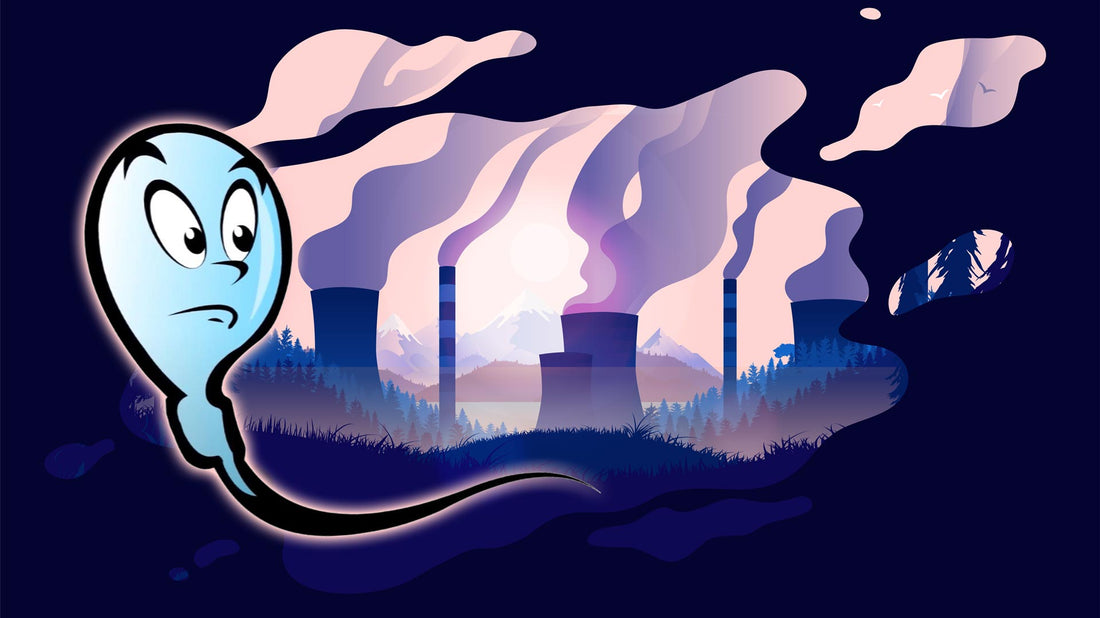Over the past 40 years, sperm counts have dropped by 50% around the globe, and many experts believe that environmental toxins may be to blame.
In our busy modern world, convenience is key. From microwave dinners to new cars and baby toys, these useful items help shape our day-to-day lives and keep them running smoothly. But unfortunately, some of this convenience may come at a cost when you focus on fertility. Plummeting sperm counts have caused concern across the scientific community, and experts warn that modern-day living may be partly to blame.
Pollution
As an accepted part of the hustle and bustle of city living, pollution is everywhere. High levels of pollution are believed to reduce sperm quality by inducing oxidative stress, which is caused when reactive oxygen species, a type of molecule found in your body, become too high.
You need a certain amount of reactive oxygen species in your cells so they can function normally, but too many can be damaging. Particulate matter such as nitrous oxides and transition metals from pollution act as powerful oxidants in the body. These oxidants generate a surplus of reactive oxygen species in cells, resulting in oxidative stress.
Oxidative stress has been shown to cause DNA damage in sperm, which has been linked to reduced fertility potential in men. Consequently, men living in areas with high levels of pollution may have higher rates of sperm DNA damage and reduced sperm counts, motility, and morphology than men living in areas with lower pollution.
Pesticides
Pesticides protect crops from pests and help produce greater quantities of food worldwide. However, these pesticides can contain a variety of chemicals, some of which have been linked to reducing sperm quality due to their ability to act as endocrine disruptors.
Endocrine-disrupting chemicals interfere with your natural hormones and may throw your reproductive system out of balance. Hormones are essential for sperm production – mainly LH and FSH (yes, these hormones are also produced by men), which interact with the testicles, causing them to produce testosterone and initiate sperm production.
Research has shown that daily exposure to pesticides can alter the levels of these essential hormones in your body, reducing sperm counts and negatively affecting sperm morphology. Some evidence also suggests that even mild exposure to these chemicals can result in lower sperm quality and increased sperm DNA damage.
Plastics
Plastics are often referred to as ‘every day, everywhere’ items that play a fundamental role in all aspects of our daily lives. Plastics come in many different shapes and sizes, and the properties of each kind of plastic can differ, based on the materials used to produce it.
Like pesticides, many plastics contain elements that act as endocrine disruptors. These alter the body’s hormone balance and disrupt our reproductive functions. A group of chemicals found in plastic that many experts are particularly concerned about are phthalates. Phthalates help make plastics more flexible and are often used in tubing systems for food processing. These chemicals also help to retain fragrance and color and can be found in cosmetic products and perfumes.
Phthalates do not stay exclusively within the products to which they are initially added. Instead, they often ‘off-gas’ into the atmosphere, entering the processed foods we eat and the air we breathe. Low-level exposure to Phthalates has been associated with reduced semen analysis parameters and lower testosterone concentrations in men.
Keeping Yourself Healthy
Although it is impossible to avoid pollution, pesticides, and plastics altogether, there are a few things we can all do to reduce our exposure and protect our fertility:
- Take Antioxidants – Antioxidants can help reduce reactive oxygen species in your body and may help mitigate high levels of oxidative stress. Always discuss supplements with your healthcare provider first, as high levels of antioxidants in your body can also be damaging.
- Minimize Intake of Processed Foods – Cutting back even a little bit may help reduce the number of phthalates that enter your body over days, months, and years.
- Learn Which Cosmetic Products Contain Phthalates – A quick Google search will bring up a list of phthalate-free brands.
- Ditch Single-Use Plastics – Reduce your exposure to chemicals from plastic by switching to reusable cutlery, cups, plates, and straws.
- Wash Your Fruits and Vegetables – Minimize your exposure to pesticides by washing your fruits and vegetables before you eat them. Or, even better, go organic as these foods are produced without using pesticides.
- Keep it Smoke-Free – Avoid the smoking section to limit your secondhand smoke intake. If you are a smoker, now is the time to quit if you are trying to conceive.
- Exercise in a Healthy Place – Avoid high pollution areas when it’s time to work out. Instead, focus on areas away from traffic, such as mountains, lakes, rivers, and other open environments.
- Use an Air Purifier at Home – If you live in an area with high pollution levels, buying an air purifier may be worth the investment.
- Wear a Mask – High filtration masks, called particulate masks, can help reduce the number of pollutants that enter your body.
- Wear PPE – If your job requires you to be in frequent contact with any endocrine-disrupting chemicals, it’s essential to wear the appropriate protective equipment to keep your swimmers safe.
Wrapping Things Up
Do you live in an area with lots of pollution, or do you frequently dine on microwave meals? Fear not. Luckily, your sperm are being refreshed and reproduced constantly. Make some lifestyle changes to reduce your exposure to endocrine-disrupting chemicals and other pollutants. You may see an increase in your sperm quality in as little as three months.
You can track the improvement of your swimmers with the YO Male Fertility Test.
Remember, it ALL Started with a Sperm & Egg.

